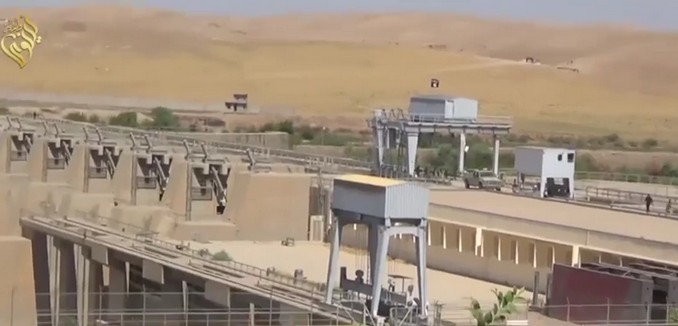Yesterday Bloomberg reported on the gains ISIS, now calling themselves the Islamic State, has made in northern Iraq recently.
Islamic State’s rampage through northern Iraq has inspired terror as stories spread of beheadings and crucifixions. At the same time, its fighters are capturing the strategic assets needed to fund the Islamic caliphate it announced in June and strengthen its grip on the territory already captured.
“These extremists are not just mad,” said Salman Shaikh, director of the Brookings Institution’s Doha Center in Qatar. “There’s a method to their madness, because they’ve managed to amass cash and natural resources, both oil and water, the two most important things. And of course they are going to use those as a way of continuing to grow and strengthen.”
Shaikh’s allusion to ISIS amassing “oil and water” is a reference to the group’s capture of a number of oil fields, and, as of last week, the Mosul dam. Control of the dam not only gives ISIS control over electricity, but, according to one observer, the ability to blackmail the government.
Aziz Alwash, an environmental adviser to the [Iraqi] Water Resources Ministry, said he’s concerned the militants will use the dam to blackmail the government. The dam needs cement injections as part of its maintenance, he said.
“Mosul city would drown within three hours” if the dam broke, he said Aug. 10 in a telephone interview. Other cities down the road to Baghdad would also be inundated while the capital would be under water within four hours. The dam has a capacity of 20-30 billion cubic meters, he said.
Iraqi troops had been guarding the dam, but when they fled, they were replaced by Kurdish Peshmerga troops, who were in turn driven off last week by ISIS. The dam is an effective base for ISIS, as it knows the dam “wouldn’t be bombed.”
Due to the strategic assets it as captured, ISIS is referred to by some experts as “the world’s richest terror group.”
The Wall Street Journal reported Tuesday that, backed by American airstrikes, Kurdish troops have rolled back some of ISIS’s recent gains.
Meanwhile, the U.S. attacked the radical Sunni group Islamic State for a third straight day, and said the airstrikes appear to have slowed the insurgents’ rapid advance over the past week toward Erbil, the capital of the semiautonomous Kurdistan region. So far, the primary focus of the strikes has been on the forces closing in on the city, where Kurdish Peshmerga fighters have been struggling to turn back the offensive. The most recent round of strikes occurred at 4 p.m. EDT on Sunday, destroying several vehicles part of an Islamic State convoy moving to attack Kuridsh Peshmerga militia forces, officials said Monday.
The Peshmerga said they overtook Islamic State positions in Makhmur District, a region north of the city of Kirkuk, as well as the nearby town of Gwair. The fighters, also known as ISIS or ISIL, had taken over the two towns last week as part of a broader push toward Erbil.
[Photo: CCTV America / YouTube ]




